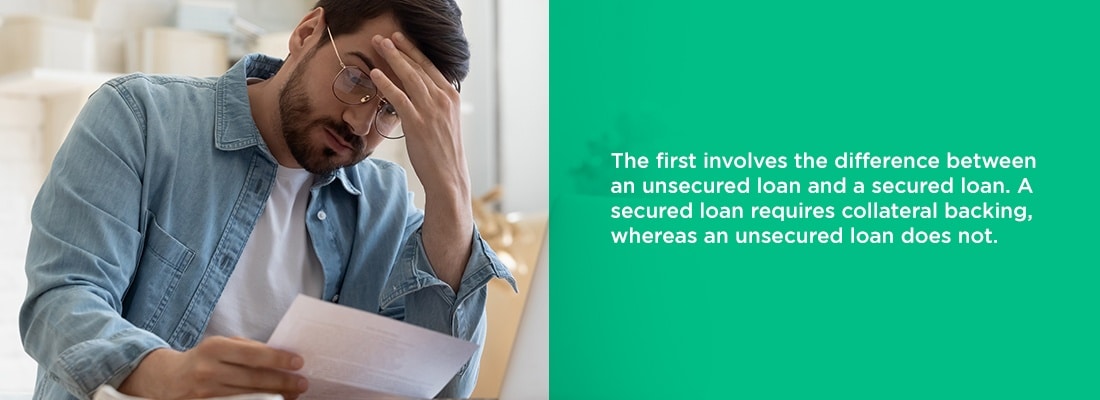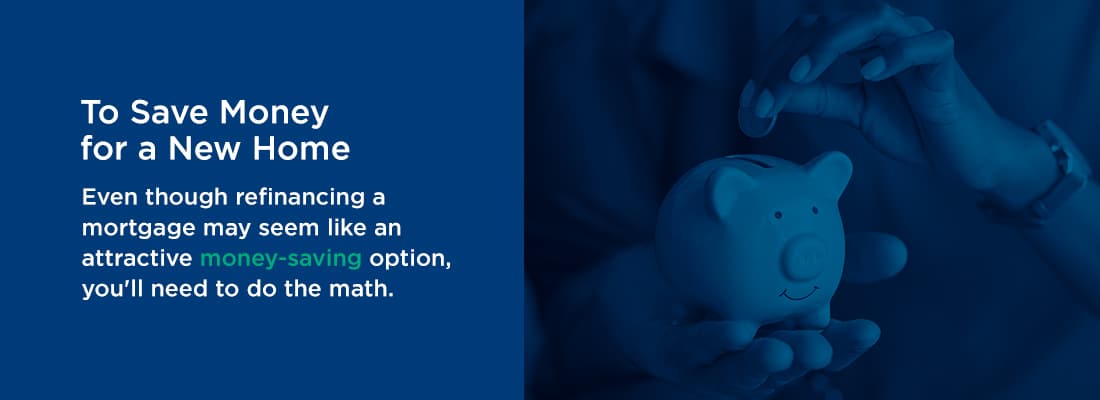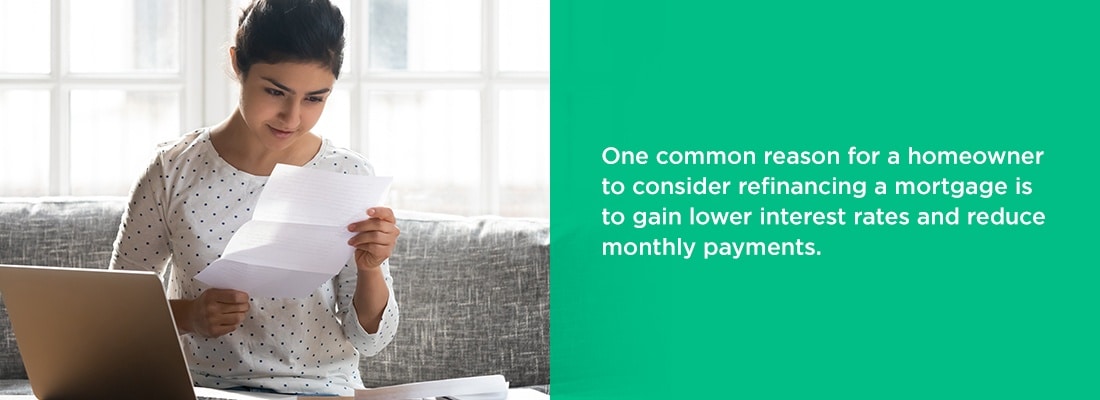If you’ve had your existing home loan and mortgage for a little while, it’s only natural to wonder if you could get a better deal. A mortgage is a tremendous responsibility — so you need a reliable understanding of whether refinancing is a good or bad idea. The guide below will lay out some of the pros and cons to help you make sure you’re refinancing your home for the right reasons.
Table of Contents
- Should You Refinance Your Home?
- Reasons Not to Refinance
- When is it Right to Refinance?
- Partner With Assurance Financial
Should You Refinance Your Home?
Whether or not to refinance your home is a big decision. Your choice will likely hinge on several factors, including your goals, your current financial situation and the terms of the new loan you can get.
Is it good or bad to refinance your home? The answer is that it depends. You may hear excited chatter about home refinancing from friends or coworkers currently working their way through the process. If you know mortgage rates are low and your acquaintances are boasting about the low rates they got, you might feel tempted to look into refinancing for yourself. And certainly, refinancing your home can be the right decision as long as you educate yourself thoroughly about the process and know what benefits you can and cannot achieve.
Refinancing your home is often an attractive idea in specific scenarios. Say you need ready cash to tackle a financial emergency or want to pay off your mortgage more rapidly. In that case, refinancing can often give you the flexibility and security you need to weather a challenging time or meet your financial goals sooner.
Even though the idea of refinancing your home can be enticing and the results can bring you real benefits, you should also be aware of certain realities of the process. When you’re thinking about whether or not to refinance, here are a few considerations to keep in mind:
- Time requirements: With some lenders, refinancing your mortgage is often time-consuming and laborious — you’ll likely need to gather up documents like bank statements and pay stubs to demonstrate your financial stability and convince the lender that you’re a low-risk investment. Fortunately, with Assurance Financial, you can apply in as little as 15 minutes.
- Expenses: The expenses of refinancing a home also sometimes undo some of the expected financial advantages. Fees and closing costs could quickly add up, and the new loan may have a higher rate that increases the homeowner’s financial burden over time. A “no-cost” mortgage may come with a particularly high interest rate that negates the anticipated monetary benefits.
- Hit to your credit: In thinking about whether to refinance a mortgage or not, many people also wonder if the refinancing process will hurt their credit. The answer is that your credit may temporarily take a minor hit. Refinancing your home means the lender will pull your credit score. The pull will be a hard inquiry and may result in a temporary dip in your score. Closing out your old loan will also reduce your credit score slightly.
When you’re wondering whether to refinance or not, it helps to have clear, detailed information on the potential drawbacks and missteps so that you can make an informed decision.
Reasons Not to Refinance Your Home
Is refinancing bad for your financial goals? In some situations, refinancing’s disadvantages outweigh the potential gains. The next few sections will discuss several reasons why you may not want to refinance.
1. To Consolidate Debt
Refinancing your home in an attempt to consolidate debt can be a good financial move in some circumstances, but it isn’t always the most prudent strategy. Many homeowners who refinance to consolidate debt assume that doing so will lighten their financial burden. They may believe that by creating one payment plan with a reasonable rate, they’ll be able to make their budget more manageable.
Under the right circumstances, consolidating debt can be a smart financial move. Paying off high-interest credit card loans with a low-interest mortgage, for instance, is sometimes strategically sound because it reduces your overall payments. This strategy, however, comes with a few things you’ll need to keep in mind.
The first involves the difference between an unsecured loan and a secured loan. A secured loan requires collateral backing, whereas an unsecured loan does not. Credit card debt, for instance, is unsecured. If you fail to pay your credit card bills, the credit card company cannot come to your house and repossess any of your belongings. You may take a hit to your credit score, but that’s a far more manageable outcome than losing your car or home. In this sense, an unsecured loan is a relatively low risk, though the tradeoff is that it will probably come with much higher interest rates.
A mortgage, though, falls into the category of secured debt, with your home as collateral. If you consolidate extensive debts into your mortgage and then fail to make the required payments, you could well find yourself facing a home foreclosure.
An additional consideration is that many homeowners who refinance for debt-management reasons also end up creating a slippery financial slope for themselves. If they cannot manage their spending, they may quickly accumulate new credit card balances and have trouble paying them down along with the new mortgage payments. Remember that it’s always free to review your options with Assurance Financial — we can help you weigh the pros and cons of restructuring your debt.
2. To Save Money for a New Home
Some homeowners become interested in refinancing their mortgages because they want to save money for a down payment on a new home. However, a move like this can have significant drawbacks. Be prepared to crunch the numbers to figure out whether this strategy will help you save money or not. You’ll need to figure out how soon a mortgage refinance will help you start saving money and whether that timeline aligns with your time frame for moving.
Say that refinancing your home would give you lower mortgage payments each month. Say also that the upfront expenses of refinancing are significant enough that it would be four years before your monthly savings made the cost of the new loan worthwhile.
If you’re not planning to move for several years, this strategy will probably work out well. If you’d rather move within the next two or three years, though, refinancing your home in this way wouldn’t help you save enough money in time.
The bottom line is that even though refinancing a mortgage may seem like an attractive money-saving option, you’ll need to do the math. That way, you’ll know how soon you’ll see benefits and whether that timeline will align well with your financial priorities. You can use Assurance Financial’s refinancing calculator to investigate more specific numbers and calculate concrete refinancing costs and savings.
3. To Reduce Your Payments
One common reason for a homeowner to consider refinancing a mortgage is to gain lower interest rates and reduce monthly payments. Doing this gives you the immediate financial freedom to save, invest or have more cash on hand for expenditures each month. If your goal is to save money every month, this is a good strategy for you.
However, in terms of your overall financial planning, your monthly payments are less important than your loan’s total cost. Imagine that you refinance a 20-year mortgage into a 30-year mortgage — the mortgage terms that 90% of Americans tend to choose — to gain a slightly lower monthly payment.
While you’ll pay less per month, you’ll now be paying your mortgage for an extra 10 years. Say your mortgage payment is $1,500 per month. That adds an extra $180,000 to your mortgage’s total cost — $1,500 x 12 x 10. Even if you save $250 a month, in 25 years, that only adds up to $75,000 in savings. This scenario is another excellent example of a place you can use our mortgage calculators to take a closer look at the numbers for your home.
4. To Focus on Investments
Homeowners sometimes consider a mortgage refinance in hopes of saving money they can then put into their financial investments. In theory, this approach is sounder than refinancing merely to reduce monthly payments. After all, even if your monthly savings are modest, you can invest the extra money to significantly increase your funds.
This strategy has its drawbacks as well, though. If you’re not careful, you might end up putting your money into investments that yield a lower interest rate than the rate on your mortgage. Be sure to select investments with higher yields than your mortgage rate so you can ensure a profitable tradeoff.
Practically speaking, refinancing your mortgage to put the monthly savings into investments often creates an additional challenge. It’s all too tempting to spend the money instead of investing it. Despite your best intentions, you may end up siphoning off a little cash at some point to put toward a big purchase or pad your holiday budget a little. Each time you do it, you may tell yourself it’s all right because it’s not that much money — $20 here, $40 there.
Over time, those small splurges add up to a significant sum that you haven’t invested. Once that happens, if you’re not investing more than you’re paying in interest on your mortgage, you lose the benefit of having refinanced your home.
In some cases, though, refinancing to focus on strong investments may work out well. Talk to one of the knowledgeable professionals at Assurance Financial to figure out what strategy is right for you.
5. If You’re Planning on Moving
We’ve discussed how important it is to do the right calculations before refinancing your current home so you can save up to buy a new house. Be sure the timeline on which you’ll start recouping your refinancing expenses in monthly savings is compatible with your time frame for purchasing the new home.
If you’re planning on moving soon, refinancing your current home generally isn’t wise. In most scenarios, you won’t have time to reap the benefits of the refinanced loan before you have to start over with a loan for your new home purchase. Banks and lenders tend to front-load the interest costs into the early payments, so you’ll pay larger chunks at the beginning of your loan than at the end. If you know your tenure in your home is going to be short, paying so much upfront doesn’t make much sense.
You might also be considering switching from a fixed-rate to an adjustable-rate mortgage (ARM) if you are planning a move in the near future. An adjustable-rate mortgage sometimes seems appealing because its rate changes to reflect the current market rates. If market rates go down, you’ll be able to take advantage of those new, lower rates yourself instead of being locked in at your initial, higher rate.
However, adjustable-rate mortgages work the other way, too. If market rates go up, your interest rate will go up also when your ARM resets. If you’re planning to move, you might feel tempted to go with the ARM because you think you’ll move before the higher rates can kick in. This strategy can be a risky gamble, though. If your moving timeline gets delayed and your mortgage does reset to the new, higher market rates, you can find yourself paying much more in interest fees than you bargained for.
In some scenarios, refinancing even though you plan to move soon is a sound strategy because of the rate benefits you may gain. Talk to one of our experienced advisors to get more insight into what’s best for your situation.
6. If You Don’t Have Enough Equity in Your Home
Some homeowners consider refinancing their mortgages when they don’t have much equity built up in their homes. This plan is often a risky one as well.
Leveraging your home’s equity can sometimes be a wise strategy. If you have sufficient equity built up in your home — say you’ve been making a steady stream of mortgage payments and paid off a substantial part of your home’s value — it becomes easy for you to borrow against that value through a home equity loan. You might take out a home equity loan for a renovation project, for instance, so you can upgrade your home and increase its resale value.
However, not having enough equity in your home can make refinancing risky, especially if you do plan to take out home equity loans. Most lenders want you to have a reasonably low loan-to-value (LTV) ratio before they’ll consider refinancing your mortgage. LTV refers to the amount of your remaining loan in proportion to the value of your home. If you haven’t paid off much of your loan — and, therefore, haven’t built up much equity — many lenders will pass on giving you a new loan for refinancing.
The specific number will vary among different banks and lenders. On average, many lenders will look to see whether you have at least 20% home equity before they’ll consider you a strong candidate for refinancing. If you haven’t yet hit that 20% threshold, you may need to spend a few years making interest payments before you qualify for favorable refinancing terms.
Remember, too, that if you refinance and take out a home equity loan simultaneously, you’ll end up paying interest on both. This increases your monthly expenditures and cuts significantly into the savings you might have received from refinancing your mortgage.
Keeping as much equity in your home as you can is often the best approach to take for your financial security. But in many cases, homeowners cash in some of their home equity to cover the closing costs and other fees associated with refinancing. If you don’t have much home equity to begin with, doing so can put you right back where you started in terms of your progress toward paying off your loan.
As you weigh your options, try plugging some numbers into our refinancing calculator, or reach out to one of our friendly advisors for help.
When Is the Right Time to Refinance?
So far, we’ve primarily discussed reasons you might opt not to refinance your home. In light of these potential drawbacks, is refinancing ever a good idea?
Despite the cautions laid out above, refinancing your home can be beneficial in some scenarios. Here are some examples.
1. You Can Secure a Lower Interest Rate and Long-Term Financial Savings
Refinancing for a lower interest rate is a common strategy among homeowners. If you can refinance your home to get a lower interest rate without incurring costs that wipe out your interest savings, this is often a smart way to go.
Recent evidence suggests more homeowners should take advantage of this option — a 2016 paper in the Journal of Financial Economics reported that in a sample of Americans for whom refinancing would have been favorable, 20% failed to pursue the possibility. These homeowners forfeited savings of about $11,500 on average, the paper concluded.
Restructuring your mortgage so you can get a lower interest rate is a sound idea — just be sure you’ve done the right calculations to ensure you won’t be paying more elsewhere. If you’ll incur hefty fees or end up making payments over a significantly extended time frame, this strategy may not pay off. You should still refinance your mortgage if reducing your interest rate ends up giving you a better overall deal — just put in the extra work to check out the details to make sure it does.
[download_section]
2. You Can Shorten the Terms of Your Loan
In some cases, you’ll be able to restructure your loan so you’re paying about the same interest rates over a much more condensed amount of time. In this scenario, refinancing your home can be an excellent financial boon. If you can get similar rates, your monthly payments won’t increase too much, and making fewer payments will give you substantial savings in the long run.
3. Your Credit Score, Income or Home Value Has Increased
An increase in your credit score, income or home value is often a signal that refinancing your mortgage will result in a favorable financial outcome:
- Credit score: If your credit score increases significantly, lenders will likely view you as a more secure and attractive risk. With a better credit score, you can often qualify for better loan terms, including lower interest rates, that make refinancing your home a worthwhile option.
- Income: If you change jobs, get a raise or otherwise boost your household income, you’ll also become a more attractive prospect for lenders. Providing proof of a higher income can often get you more favorable interest rates if you choose to refinance.
- Home value: If the housing market in your area is hot, the value of your home may rise over the years. In that case, you can leverage that value to your benefit. You may also be able to get cash-out refinancing, which allows you to apply for a larger mortgage and then receive the difference between your old and new mortgages in cash.
Partner With Assurance Financial for Help With Refinancing Your Home
Once you’ve gone through the pros and cons and decided refinancing is the right choice, what’s the next step?
For reliable, knowledgeable assistance with refinancing your home, contact Assurance Financial. We can give you a free rate quote and then help you gain a custom, competitive rate that makes refinancing an ideal option for you.
At Assurance Financial, we make it easy to apply for a mortgage and estimate costs during the process. When you work with us on refinancing your home, you’ll gain quick, dependable service and be able to determine right away which options make sense for your needs and budget. We also have every type of loan available on the market — from conventional mortgages and Veteran’s Affairs (VA) loans to Federal Housing Administration (FHA) loans and loans tailored specifically to modular and jumbo homes.
Some mortgage companies promise quick, digital service. With Assurance Financial, you’ll get something better: personal service that takes your individual goals into account. We never outsource your loan details, either — we underwrite everything in-house. You’ll gain the peace of mind of knowing your information is secure and that we’re handling everything with a personal, knowledgeable touch.
Contact us today to start a conversation about refinancing your home, or start a loan application online.
Sources:
- https://assurancemortgage.com/calculators/should-i-refinance-my-mortgage/
- https://sf.freddiemac.com/articles/insights/why-americas-homebuyers-communities-rely-on-the-30-year-fixed-rate-mortgage
- https://assurancemortgage.com/calculators/
- https://www.investopedia.com/terms/l/loantovalue.asp
- https://www.forbes.com/advisor/refiroadmap/
- https://assurancemortgage.com/calculators/should-i-refinance-my-mortgage/
- https://www.sciencedirect.com/science/article/abs/pii/S0304405X16301507
- https://assurancemortgage.com/refinance-your-home/
- https://assurancemortgage.com/apply/
- https://assurancemortgage.com/contact-us/










